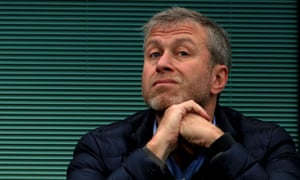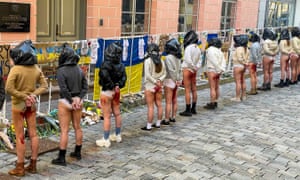09:44
Internationally appointed human rights monitors have found “clear patterns” of violations of international humanitarian law by “Russian forces in their conduct of hostilities” in a preliminary assessment of the conduct of the seven-week-long war in Ukraine.
The three experts, appointed by the 57-country OSCE, whose members cover Europe, North America and central Asia, said that had Russia respected humanitarian law and avoided shelling hospitals and other protected infrastructure then “the number of civilians killed or injured would have remained much lower”.
“Considerably fewer houses, hospitals, cultural properties, schools, multi-storey residential buildings, water stations and electricity systems would have been damaged or destroyed,” the monitors continue in a report released by the OSCE on Wednesday.
But it also found human rights “violations and problems” attributable to Ukraine, in particular “the treatment of prisoners of war, who originally were considered criminals” after video emerged that appeared to show Russian soldiers being shot in the leg by their captors.
The UN office of the High Commissioner for Human Rights (OHCHR) has so far formally recorded 4,450 civilian casualties in Ukraine since the war began, of which have been 1,892 killed and 2,558 injured. But the figure is almost certainly an underestimate due to the difficulties of accurate documentation while fighting is ongoing.
Ukraine was one of 45 OSCE countries that agreed to appoint the monitors, but Russia did not cooperate, meaning that the monitoring group had to rely on Russian public statements, where available, for its perspective on alleged human rights violations.
Updated
09:22
Here is Jon Henley’s round-up of the latest reports from the war on Ukraine:
More than 1,000 Ukrainian marines defending the besieged port city of Mariupol have surrendered, Moscow has said, as the presidents of four countries bordering Russia head to Kyiv in a show of support for Ukraine.
In one of the most critical battles of the war, Russia’s defence ministry said on Wednesday 1,026 soldiers from Ukraine’s 36th Marine Brigade, including 162 officers, had “voluntarily laid down their arms” near the city’s Ilyich iron and steelworks. There was no independent confirmation of the claim.
The city, the main target yet to be brought under Russian control in the eastern Donbas region, has been encircled and largely reduced to rubble during Moscow’s seven-week invasion. The city’s mayor has said 21,000 civilians have died.
Its capture would mark the first fall of a major Ukrainian city and would help Russia secure a land passage between the self-proclaimed republics in Donetsk and Luhansk in Donbas and Crimea, which Moscow occupied and annexed in 2014.
Read more of Jon Henley’s round-up here: More than 1,000 Ukraine marines have surrendered in Mariupol, says Russia
Updated
08:47
Joe Biden has upped the ante in his criticisms of Vladimir Putin’s actions in Ukraine by accusing him of genocide, saying the Russian leader is “trying to wipe out the idea of even being Ukrainian”.
But how significant is the allegation and how likely is Putin to face genocide charges?

Genocide is one of four crimes prosecuted by the international criminal court (ICC) and generally considered to be the most grave.
The court defines it as being:
Characterised by the specific intent to destroy in whole or in part a national, ethnic, racial or religious group by killing its members or by other means: causing serious bodily or mental harm to members of the group; deliberately inflicting on the group conditions of life calculated to bring about its physical destruction in whole or in part; imposing measures intended to prevent births within the group; or forcibly transferring children of the group to another group.
The court, based in The Hague in the Netherlands, has been criticised over its limited number of successful prosecutions: 10, all for war crimes and/or crimes against humanity, with none for genocide. When the ICC prosecutor, Karim Khan, announced in February that he was opening a case into events in Ukraine, he said there was “a reasonable basis to believe that both alleged war crimes and crimes against humanity have been committed”.
Updated





